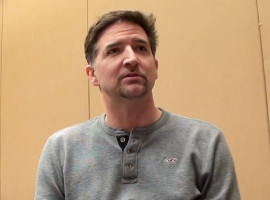InfoQ Homepage Architecture & Design Content on InfoQ
-
Kohsuke Kawaguchi, Creator of Jenkins Discusses its History, Present and Future
Kohsuke Kawaguchi, the creator of Jenkins talks to InfoQ's Rags Srinivas about Jenkins: the past, present and future, including Jenkins 2.0 which is the largest release by far.

-
Jason McGee of IBM Talks about Open Source Projects and the Interactions at the Collaboration Summit
Jason McGee of IBM talks to Rags Srinivas of InfoQ about the importance of different open source initiatives, like Container Native Cloud Foundation (CNCF), Open Container Initiative (OCI) and how to sort through them from a developer perspective.

-
Cornelia Davis Talks about Software Transformation in Enterprises
Cornelia Davis talks to Rags Srinivas about the importance of software transformation and the importance of feedback, Continuous Integration and Delivery and how culture and technology play a role in the transformation process.

-
Aviran Mordo Discusses Technical Leadership, DevOps and Distributed Computing
Aviran Mordo discusses the skills required for technical leadership, his thoughts on DevOps, and the journey WIX has taken when implementing a microservice-based architecture. Mordo suggests that although architects may not be able to code full-time, they must remain 'hands-on', and although many new techniques, tools and frameworks are currently emerging, care must be taken with evaluation.

-
Interview with Gil Tene on Hardware Transactional Memory
Gil Tene speaks to Alex Blewitt at QCon London 2016 on the upcoming support for hardware transactional memory in server-class Intel chips, and what it will mean for the JVM. Tene discusses what kinds of applications will benefit from speculative lock elision and increasing concurrency in the near future on multi-core server platforms.

-
John Sheehan on Web API Quality
In this interview, John Sheehan expounds on what constitutes a high quality API. The first half focuses on developer experience which will help API consumers distinguish between top tier API providers and the rest. The second half provides pointers for API providers aiming to improve various aspects of API quality, specifically performance across the API lifecycle.

-
Jon Moore on Hypermedia APIs and Distributed Monotonic Clocks
The interview with Jon Moore begins with a discussion on the relevance of Hypermedia APIs in the context of micro-services as well as the impact of HTTP 2.0 on APIs in general.The second half of the interview focuses on event causality in distributed systems and Moore's research on the application of population protocols for better clock synchronization.

-
Adam Wick on Security, Formal Methods, Types, Unikernels, HaLVM, DRM
Adam Wick talks about software security, research into formal methods and randomisation as well as documentation and types to help write secure software, HalVM and other Unikernels, DRM.

-
Understanding Complex Software Systems by Embracing Chaos
Modern software systems are complex and chaotic. Requirements, employee counts, and production environments change quickly. Yet the software produced under these circumstances must be understandable as well as useful. Matt Ranney, an architect at Uber, argues that to understand these complex systems you must embrace chaos, rather than run from it. You must also accept limits to our understanding.

-
Felienne Hermans on Applying Software Engineering Methods to Spreadsheets
Felienne Hermans explains the how and why of applying software engineering methods (testing, static analysis, refactoring) to spreadsheets.

-
Michael Bryzek on Handling Microservices in the Real World
Microservices have been a trending topic for some time now and while we talked a lot about concepts in the past there are more and more real-life experiences to draw on now. In this interview, Michael Bryzek, co-founder and former CTO of Gilt, shares some of his experience working with microservices including how we should design our architectures and APIs to avoid ending up in a dependency hell.

-
Kolton Andrus on Breaking Things at Netflix
Kolton Andrus is working as "chaos engineer" at Netflix which means he is getting paid for breaking things in production. We are talking with about how to improve overall system quality by injecting failures in production systems, about the idea of "anti-fragility" in the context of software and about how engineering teams of all layers can benefit from a failure injection infrastructure.
